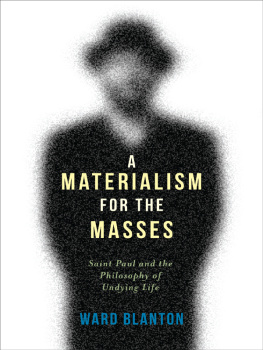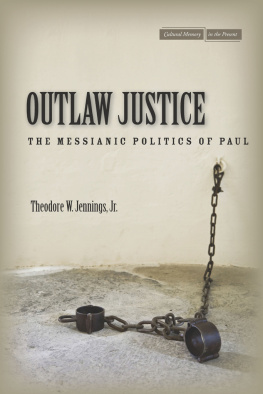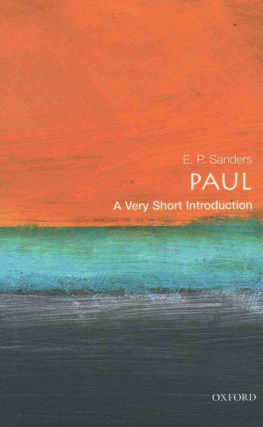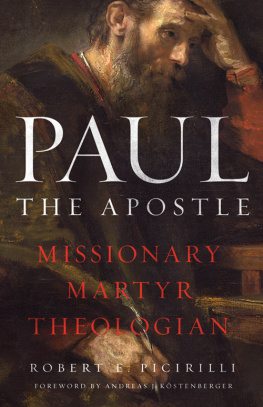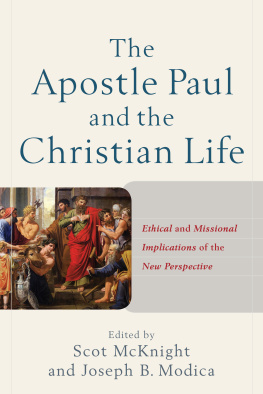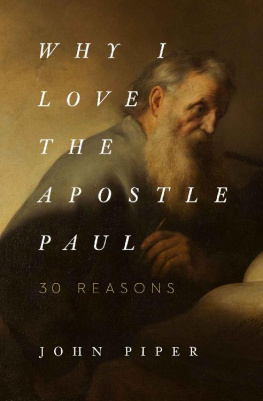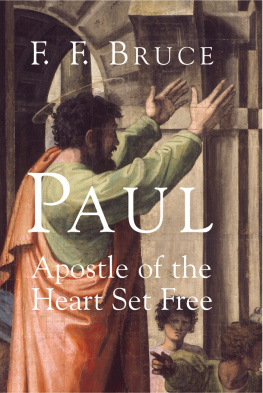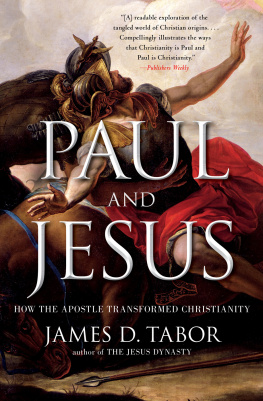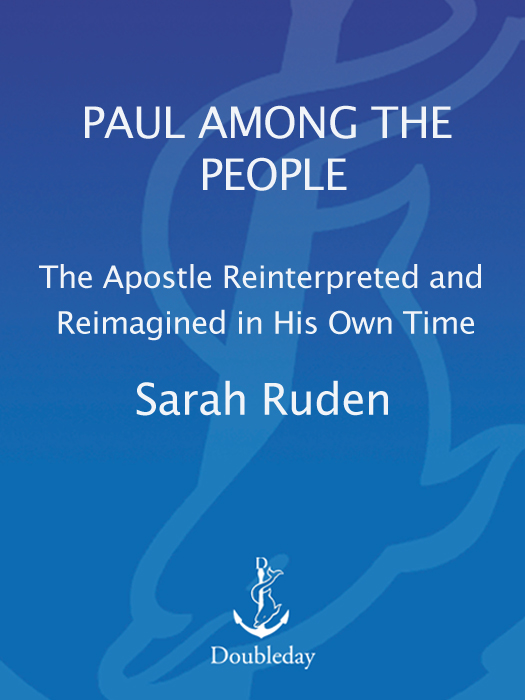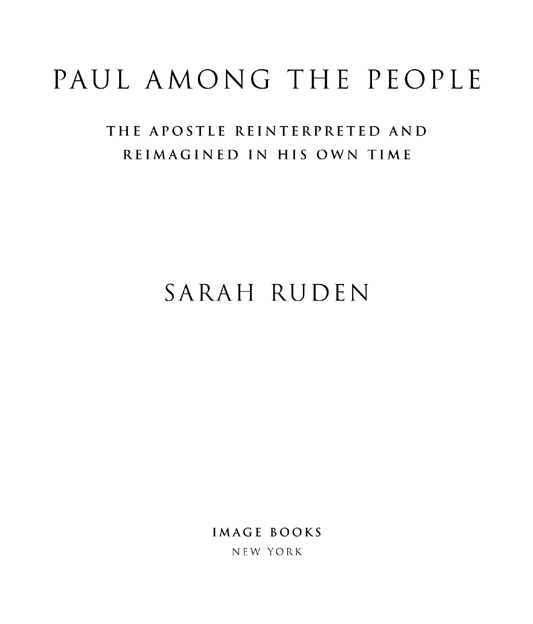ALSO BY SARAH RUDEN
TRANSLATIONS
The Aeneid: Vergil
The Homeric Hymns
Aristophanes: Lysistrata
Petronius: Satyricon
ORIGINAL POETRY
Other Places

Copyright 2010 by Sarah Ruden
All rights reserved.
Published in the United States by Image Books, an imprint of the Crown
Publishing Group, a division of Random House, Inc., New York.
www.crownpublishing.com
IMAGE and the Image colophon are registered trademarks of Random House, Inc.
Originally published in hardcover in the United States by Pantheon Books, a division of Random House, Inc., New York, in 2010.
Grateful acknowledgment is made to the following for permission to reprint previously published material:
Hackett Publishing Company, Inc.: Excerpts from Homeric Hymns, translated by Sarah Ruden, copyright 2005 by Hackett Publishing Company, Inc. (Indianapolis: Hackett Publishing Company, 2005); excerpts from Lysistrata by Aristophanes, translated by Sarah Ruden, copyright 2003 by Hackett Publishing Company, Inc. (Indianapolis: Hackett Publishing Company, 2003); and excerpts from Satyricon by Petronius, translated by Sarah Ruden, copyright 2000 by Hackett Publishing Company, Inc. (Indianapolis: Hackett Publishing Company, 2000). All rights reserved. Reprinted by permission of Hackett Publishing Company, Inc.
Yale University Press: Excerpts from The Aeneid by Vergil, translated by Sarah Ruden, copyright 2008 by Yale University. Reprinted by permission of Yale University Press.
Library of Congress Cataloging-in-Publication Data
Ruden, Sarah.
Paul among the people : The Apostle reinterpreted and reimagined in his own time / Sarah Ruden.
p. cm.
Includes bibliographical references (p. ).
1. Bible. N.T. Epistles of PaulTheology. 2. Paul, the Apostle, Saint. I. Title.
BS2651.R83 2010
225.92dc22 2009020969
eISBN: 978-0-307-37902-3
v3.1_r1
FOR
THE LATE PROFESSOR W. V. CLAUSEN,
MY TEACHER
You, by the window here with me,
Who never spoke to me before,
But called me in
When I went by your office door,
You are a stranger
Why insist I see
What stands below your window there,
The white tree?
The spring went by like a dull rain
Of It is gone, You cannot have it,
We will have to see,
And then you showed me this,
The glittering tree,
Which stands out in an open place,
For anyone at all to see,
And now I am that anyone,
Since when he looks, he looks for love of me,
And I for love of him,
At the flowering tree.
It is so hard to say, so plain to see.
But you have made it speak, it speaks through me:
The vivid tree.
CONTENTS
3. NO CLOSET, NO MONSTERS?
PAUL AND HOMOSEXUALITY
4. AN APOSTOLIC OINKER?
PAUL AND WOMEN
5. JUST FOLLOWING ORDERS?
PAUL AND THE STATE
6. NOBODY HERE BUT US BONDSMEN:
PAUL AND SLAVERY
7. LOVE JUST IS:
PAUL ON THE FOUNDATION OF THE NEW COMMUNITY
ACKNOWLEDGMENTS
Thanks abound, for spiritual, scholarly, and practical help: to David and Marjorie Ball, Marcelle Martin, and Ken and Katharine Jacobsen at Pendle Hill Quaker Study Center; to Sheila Murnaghan and the Classics Department at the University of Pennsylvania; to my agents, Glen Hartley and Lynn Chu; to Yale Divinity SchoolI was a stranger, and you took me in; to Leslie Williamshungry, and you fed me; and to George and Sadie Stegmann, Caro Attwell, and Tom Conroyni me plus oculis vestris amaretis.
PREFACE: WHO WAS PAUL?
P robably around a decade after the birth of Christ, the person who would become the most important exponent of Christianity was born. Paul belonged to a Jewish family in the port city of Tarsus (on the southern coast of what is now Turkey), in the Roman province of Cilicia. He was originally called Saul, the name of a king in the Hebrew Bible, but as a missionary of the new sect he adopted the name of Roman origin by which he is still commonly known, sometimes with the addition of the title Saint or the apostle.
Paul was a native or early Greek speaker, and all of his surviving writings are in that language. According to Acts of the Apostles (the New Testament book that recounts events after those in the four gospels), he was fluent in Hebrew as well (Acts 21:4022:20). How much Latin he knew is uncertain. Acts shows him dealing suavely with Roman officials, but many Romans read and spoke Greek, the business language of the entire Mediterranean.
Tarsus had come under the Greek Seleucid empire more than 250 years before falling to the Romans in the early first century B.C . It was a cosmopolitan city: as almost everywhere, the Greeks and Romans had overridden all previous hegemonies (which in this case were Hittite, Assyrian, and Persian). Tarsus was known for commerce, for the same kind of oratorical and philosophical higher education enjoyed at Athens and Rome, and for its cult of Hercules. It had all of the public works of any established Roman provincial capital, including monumental temples, a stadium, and a sophisticated water supply.
Since Paul was a tent maker, and since trades were usually passed on through families, it is safe to assume that this was the family business. It is a tricky question whether he was a Roman citizen. This would not have been odd for a provincial from a respectable family. But if Paul had been born a citizen, as Acts testifies (22:2728), why did he only onceand only quite late, after years of submitting to official beatings and ad hoc imprisonmentinvoke his privilege of a legal process ending at Rome? Perhaps it was one thing to be a Roman citizen, another to rely on citizenship amid the touchy religious and cultural politics he had to negotiate. Since he does not seem to have traveled with the usual entourage (including slaves) of a man of position, it would have been easy to assume he was not a Roman citizen.
Even more confusing, this cultured and influential man, who never questioned his own prerogatives as a leader, supported himself at times by crafting tents with his own hands. Andof coursewhat about the strange religion he was aggressively spreading? His legal status must have been only one question in peoples minds as they tried to work out who he was, what he was up to, and how to react to him.
As a young man, Paul went to Jerusalem for Jewish religious purposes, and by his own account he was a Pharisee (Philippians 3:5). This group was concerned with ritual purity, especially in and around the Temple. Marriage was prescribed for such men, but there is no telling whether Paul ever had a wife or children.
While in Jerusalem, he became an agent of the Temple in attacking the recently crucified Jesus followers, who were playing a disruptive and precarious role within Judaism. On the road to Damascus with documents authorizing a purge in that city, he heard the voice of Jesus rebuking him, was blinded, and recovered to be baptized and slowly work his way into the new movement (Acts 9ff.; Galatians 1:1324).


